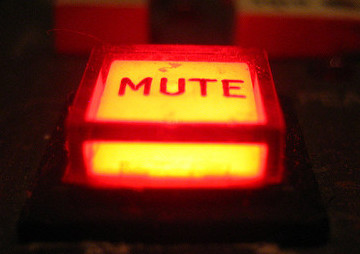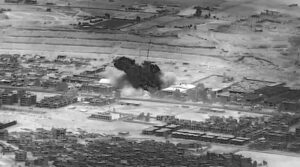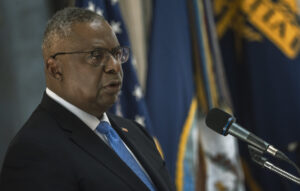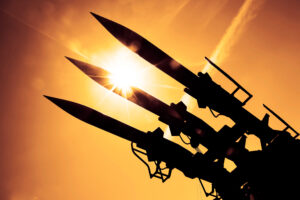Why It’s So Hard for Members of the Military to Speak Out
Assuming that many privates and generals have complicated, often highly critical feelings about various crises of war-making, why don’t they ever express them publicly? Jeremy Keith / CC-BY-2.0
1
2
3
Jeremy Keith / CC-BY-2.0
1
2
3
The United States is now engaged in perpetual war with victory nowhere in sight. Iraq is chaotic and scarred. So, too, is Libya. Syria barely exists. After 15 years, “progress” in Afghanistan has proven eminently reversible as efforts to rollback recent Taliban gains continue to falter. The Islamic State may be fracturing, but its various franchises are finding new and horrifying ways to replicate themselves and lash out. Having spent trillions of dollars on war with such sorry results, it’s a wonder that key figures in the U.S. military or officials in any other part of America’s colossal national security state and the military-industrial complex (“the Complex” for short) haven’t spoken out forcefully and critically about the disasters on their watch.
Yet they have remained remarkably mum when it comes to the obvious. Such a blanket silence can’t simply be attributed to the war-loving nature of the U.S. military. Sure, its warriors and warfighters always define themselves as battle-ready, but the troops themselves don’t pick the fights. Nor is it simply attributable to the Complex’s love of power and profit, though its members are hardly eager to push back against government decisions that feed the bottom line. To understand the silence of the military in particular in the face of a visible crisis of war-making, you shouldn’t assume that, from private to general, its members don’t have complicated, often highly critical feelings about what’s going on. The real question is: Why they don’t ever express them publicly?
To understand that silence means grasping all the intertwined personal, emotional, and institutional reasons why few in the military or the rest of the national security state ever speak out critically on policies that may disturb them and with which they may privately disagree. I should know, because like so many others I learned to silence my doubts during my career in the military.
My Very Own “Star Wars” Moment
As a young Air Force lieutenant at the tail end of the Cold War, I found myself working on something I loathed: the militarization of space. The Air Force had scheduled a test of an anti-satellite (ASAT) missile to be launched at high altitude from an F-15 fighter jet. The missile was designed to streak into low earth orbit to strike at the satellites of enemy powers. The Soviets were rumored to have their own ASAT capability and this was our answer. If the Soviets had a capability, Americans had to have the same — or better. We called it “deterrence.”
Ever since I was a kid, weaned on old episodes of “Star Trek,” I’d seen space as “the final frontier,” a better place than conflict-ridden Earth, a place where anything was possible — maybe even peace. As far as I was concerned, the last thing we needed was to militarize that frontier. Yet there I was in 1986 working in the Space Surveillance Center in Cheyenne Mountain in support of a test that, if it worked, would have helped turn space into yet another war zone.
It won’t surprise you to learn that, despite my feelings, which couldn’t have been stronger, I didn’t speak up against the test. Not a peep. I kept my critical thoughts and doubts to myself. I told myself that I was doing my duty, that it wasn’t my place to question decisions made at high levels in the administration of then-President Ronald Reagan. You can’t have a disciplined and orderly military if troops challenge every decision, can you? Orders are to be obeyed, right? Ours not to reason why, ours but to do or die — especially since we were then at war with the Soviets, even if that war fell under the label of “cold.”
So I buried my misgivings about facilitating a future shooting war in orbit. I remember, in fact, hoping that the ASAT test would go well and that I’d be seen as effective at my job. And in this I think I was probably pretty typical of military people, then and now.
The F-15 ASAT program was eventually cancelled, but not before it taught me a lesson that’s obvious only in retrospect: mission priorities and military imperatives in such a hierarchical situation are powerful factors in suppressing morality and critical thinking. It’s so much easier, so much more “natural,” to do one’s job and conform rather than speak out and buck a system that’s not made for the public expression of dissenting views. After all, a military with an ethos of “we’re all volunteers, so suck it up — or get out” is well suited to inhibiting dissent, as its creators intended.
To those who’ve been exposed to hierarchical, authority-heavy institutions, that lesson will undoubtedly come as no surprise. Heck, I grew up Catholic and joined the military, so I know something about the pressures to conform within such institutions. In the Church, you learn — or at least you did in my day — that the beginning of wisdom is the fear of God, and the “old guard” priests and nuns I encountered were more than ready to encourage that fear. In the military, you learn from day one of basic training that it’s best to put up and shut up. No grumbling in the ranks. No quibbling. Yes, sir; no, sir; no excuse, sir. Cooperate and graduate. That conformist mentality is difficult to challenge or change, no matter your subsequent rank or position.
There’s a sensible reason for all this. You can’t herd cats, nor can you make a cohesive military unit out of them. In life and death situations, obedience and discipline are vital to rapid action.
As true as that may be, however, America doesn’t need more obedience: it needs more dissent. Not only among its citizens but within its military — maybe there especially.
Unfortunately, in the post-9/11 era, we’ve exalted and essentially worshipped the military as “our greatest national treasure” (the words of former Defense Secretary and CIA Director Leon Panetta at the recent Democratic convention). The military has, in fact, become so crucial to Washington that aspiring civilian commanders-in-chief like Hillary Clinton and Donald Trump lean on retired generals to anoint them as qualified for the job. (For Trump, Lieutenant General Michael Flynn did the honors; for Hillary, General John Allen.)
Your support matters…Independent journalism is under threat and overshadowed by heavily funded mainstream media.
You can help level the playing field. Become a member.
Your tax-deductible contribution keeps us digging beneath the headlines to give you thought-provoking, investigative reporting and analysis that unearths what's really happening- without compromise.
Give today to support our courageous, independent journalists.







You need to be a supporter to comment.
There are currently no responses to this article.
Be the first to respond.